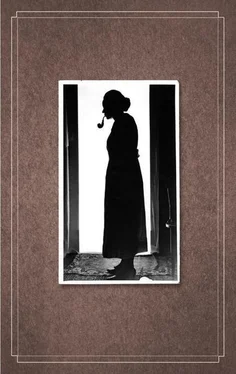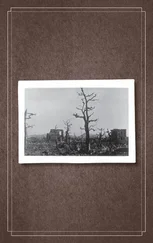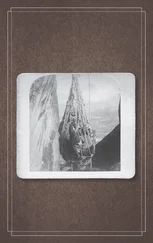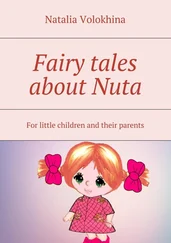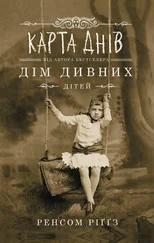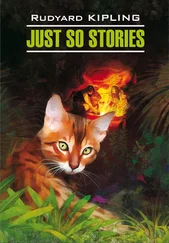My grandfather lay facedown in a bed of creeper, his legs sprawled out and one arm twisted beneath him as if he’d fallen from a great height. I thought surely he was dead. His undershirt was soaked with blood, his pants were torn, and one shoe was missing. For a long moment I just stared, the beam of my flashlight shivering across his body. When I could breathe again I said his name, but he didn’t move.
I sank to my knees and pressed the flat of my hand against his back. The blood that soaked through was still warm. I could feel him breathing ever so shallowly.
I slid my arms under him and rolled him onto his back. He was alive, though just barely, his eyes glassy, his face sunken and white. Then I saw the gashes across his midsection and nearly fainted. They were wide and deep and clotted with soil, and the ground where he’d lain was muddy from blood. I tried to pull the rags of his shirt over the wounds without looking at them.
I heard Ricky shout from the backyard. “I’M HERE!” I screamed, and maybe I should’ve said more, like danger or blood , but I couldn’t form the words. All I could think was that grandfathers were supposed to die in beds, in hushed places humming with machines, not in heaps on the sodden reeking ground with ants marching over them, a brass letter opener clutched in one trembling hand.
A letter opener. That was all he’d had to defend himself. I slid it from his finger and he grasped helplessly at the air, so I took his hand and held it. My nail-bitten fingers twinned with his, pale and webbed with purple veins.
“I have to move you,” I told him, sliding one arm under his back and another under his legs. I began to lift, but he moaned and went rigid, so I stopped. I couldn’t bear to hurt him. I couldn’t leave him either, and there was nothing to do but wait, so I gently brushed loose soil from his arms and face and thinning white hair. That’s when I noticed his lips moving.
His voice was barely audible, something less than a whisper. I leaned down and put my ear to his lips. He was mumbling, fading in and out of lucidity, shifting between English and Polish.
“I don’t understand,” I whispered. I repeated his name until his eyes seemed to focus on me, and then he drew a sharp breath and said, quietly but clearly, “Go to the island, Yakob. Here it’s not safe.”
It was the old paranoia. I squeezed his hand and assured him we were fine, he was going to be fine. That was twice in one day that I’d lied to him.
I asked him what happened, what animal had hurt him, but he wasn’t listening. “Go to the island,” he repeated. “You’ll be safe there. Promise me.”
“I will. I promise.” What else could I say?
“I thought I could protect you,” he said. “I should’ve told you a long time ago …” I could see the life going out of him.
“Told me what?” I said, choking back tears.
“There’s no time,” he whispered. Then he raised his head off the ground, trembling with the effort, and breathed into my ear: “Find the bird. In the loop. On the other side of the old man’s grave. September third, 1940.” I nodded, but he could see that I didn’t understand. With his last bit of strength, he added, “Emerson—the letter. Tell them what happened, Yakob.”
With that he sank back, spent and fading. I told him I loved him. And then he seemed to disappear into himself, his gaze drifting past me to the sky, bristling now with stars.
A moment later Ricky crashed out of the underbrush. He saw the old man limp in my arms and fell back a step. “Oh man. Oh Jesus. Oh Jesus ,” he said, rubbing his face with his hands, and as he babbled about finding a pulse and calling the cops and did you see anything in the woods, the strangest feeling came over me. I let go of my grandfather’s body and stood up, every nerve ending tingling with an instinct I didn’t know I had. There was something in the woods, all right—I could feel it.
There was no moon and no movement in the underbrush but our own, and yet somehow I knew just when to raise my flashlight and just where to aim it, and for an instant in that narrow cut of light I saw a face that seemed to have been transplanted directly from the nightmares of my childhood. It stared back with eyes that swam in dark liquid, furrowed trenches of carbon-black flesh loose on its hunched frame, its mouth hinged open grotesquely so that a mass of long eel-like tongues could wriggle out. I shouted something and then it twisted and was gone, shaking the brush and drawing Ricky’s attention. He raised his .22 and fired, pap-pap-pap-pap , saying, “What was that? What the hell was that?” But he hadn’t seen it and I couldn’t speak to tell him, frozen in place as I was, my dying flashlight flickering over the blank woods. And then I must’ve blacked out because he was saying Jacob, Jake, hey Ed areyouokayorwhat , and that’s the last thing I remember.
I spent the months following my grandfather’s death cycling through a purgatory of beige waiting rooms and anonymous offices, analyzed and interviewed, talked about just out of earshot, nodding when spoken to, repeating myself, the object of a thousand pitying glances and knitted brows. My parents treated me like a breakable heirloom, afraid to fight or fret in front of me lest I shatter.
I was plagued by wake-up-screaming nightmares so bad that I had to wear a mouth guard to keep from grinding my teeth into nubs as I slept. I couldn’t close my eyes without seeing it—that tentacle-mouth horror in the woods. I was convinced it had killed my grandfather and that it would soon return for me. Sometimes that sick panicky feeling would flood over me like it did that night and I’d be sure that nearby, lurking in a stand of dark trees, beyond the next car in a parking lot, behind the garage where I kept my bike, it was waiting.
My solution was to stop leaving the house. For weeks I refused even to venture into the driveway to collect the morning paper. I slept in a tangle of blankets on the laundry room floor, the only part of the house with no windows and also a door that locked from the inside. That’s where I spent the day of my grandfather’s funeral, sitting on the dryer with my laptop, trying to lose myself in online games.
I blamed myself for what happened. If only I’d believed him was my endless refrain. But I hadn’t believed him, and neither had anyone else, and now I knew how he must’ve felt because no one believed me, either. My version of events sounded perfectly rational until I was forced to say the words aloud, and then it sounded insane, particularly on the day I had to say them to the police officer who came to our house. I told him everything that had happened, even about the creature, as he sat nodding across the kitchen table, writing nothing in his spiral notebook. When I finished all he said was, “Great, thanks,” and then turned to my parents and asked if I’d “been to see anyone.” As if I wouldn’t know what that meant. I told him I had another statement to make and then held up my middle finger and walked out.
My parents yelled at me for the first time in weeks. It was kind of a relief, actually—that old sweet sound. I yelled some ugly things back. That they were glad Grandpa Portman was dead. That I was the only one who’d really loved him.
The cop and my parents talked in the driveway for a while, and then the cop drove off only to come back an hour later with a man who introduced himself as a sketch artist. He’d brought a big drawing pad and asked me to describe the creature again, and as I did he sketched it, stopping occasionally to ask for clarifications.
“How many eyes did it have?”
“Two.”
“Gotcha,” he said, as if monsters were a perfectly normal thing for a police sketch artist to be drawing.
Читать дальше
